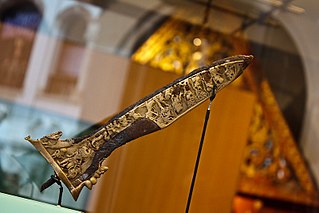Property law is the area of law that governs the various forms of ownership in real property (land) and personal property. Property refers to legally protected claims to resources, such as land and personal property, including intellectual property. Property can be exchanged through contract law, and if property is violated, one could sue under tort law to protect it.
Escheat is a common law doctrine that transfers the real property of a person who has died without heirs to the crown or state. It serves to ensure that property is not left in "limbo" without recognized ownership. It originally applied to a number of situations where a legal interest in land was destroyed by operation of law, so that the ownership of the land reverted to the immediately superior feudal lord.
In property law, title is an intangible construct representing a bundle of rights in (to) a piece of property in which a party may own either a legal interest or equitable interest. The rights in the bundle may be separated and held by different parties. It may also refer to a formal document, such as a deed, that serves as evidence of ownership. Conveyance of the document may be required in order to transfer ownership in the property to another person. Title is distinct from possession, a right that often accompanies ownership but is not necessarily sufficient to prove it. In many cases, possession and title may each be transferred independently of the other. For real property, land registration and recording provide public notice of ownership information.
A lien is a form of security interest granted over an item of property to secure the payment of a debt or performance of some other obligation. The owner of the property, who grants the lien, is referred to as the lienee and the person who has the benefit of the lien is referred to as the lienor or lien holder.

The kris, or keris in the Indonesian languages, is an Indonesian asymmetrical dagger, both weapon and spiritual object, with distinctive blade-patterning achieved through alternating laminations of iron and nickelous iron (pamor). Of Javanese origin, the kris is famous for its distinctive wavy blade, although many have straight blades as well, and is one of the weapons commonly used in the pencak silat martial art, native to Indonesia.

The Java War or Diponegoro War (ꦥꦼꦫꦁꦢꦶꦥꦤꦼꦒꦫ) was fought in central Java from 1825 to 1830, between the colonial Dutch Empire and native Javanese rebels. The war started as a rebellion led by Prince Diponegoro, a leading member of the Javanese aristocracy who had previously cooperated with the Dutch.

A fixture, as a legal concept, means any physical property that is permanently attached (fixed) to real property. Property not affixed to real property is considered a chattel property. Fixtures are treated as a part of real property, particularly in the case of a security interest. A classic example of a fixture is a building, which, in the absence of language to the contrary in a contract of sale, is considered part of the land itself and not a separate piece of property. Generally speaking, the test for deciding whether an article is a fixture or a chattel turns on the purpose of attachment. If the purpose was to enhance the land, the article is likely a fixture; if the article was affixed to enhance the use of the chattel itself, the article is likely a chattel.
The Settled Land Acts were a series of English land law enactments concerning the limits of creating a settlement, a conveyancing device used by a property owner who wants to ensure that provision of future generations of his family.
In law, sequestration is the act of removing, separating, or seizing anything from the possession of its owner under process of law for the benefit of creditors or the state.
English property law is the law of acquisition, sharing and protection of valuable assets in England and Wales. While part of the United Kingdom, many elements of Scots property law are different. In England, property law encompasses four main topics:
Hyatt v. Vincennes Nat. Bank, 113 U.S. 408 (1885), was a case involving the sale of property conveyed to Hyatt for a term of 50 years for all the mineral coal upon and under a described tract of land, in Knox County, Indiana, with the exclusive right to enter on the land to dig for the coal, and remove it, and to occupy with constructions and buildings as needed to obtain the coal. Hyatt would then have the right to remove all buildings or fixtures placed on the land, when the agreement expired, and to pay a fixed royalty for the coal mined.

Mortgage Corporation v Shaire [2001] Ch 743 is a widely reported English land law case relating to the Trusts of Land and Appointment of Trustees Act 1996. Such a status specifically flowed from an instance of non est factum mortgage fraud where the mortgage lender and the defrauded co-owner wished to accelerate and delay sale respectively. The case is relevant to matrimonial law in that the respective equitable shares in the home awarded to Mrs Shaire and Mr Fox in 1987 matrimonial proceedings were never defined and it fell to the court to define these.
Conversion is an intentional tort consisting of "taking with the intent of exercising over the chattel an ownership inconsistent with the real owner's right of possession". In England & Wales, it is a tort of strict liability. Its equivalents in criminal law include larceny or theft and criminal conversion. In those jurisdictions that recognise it, criminal conversion is a lesser crime than theft/larceny.
Gelgel is a village (desa) in the regency (kabupaten) of Klungkung, on Bali, Indonesia. The village, near the coast four kilometers south of the regency capital Semarapura, contains a number of structures of cultural interest, and is known for its pottery and handwoven ceremonial songket cloth. The height of the village's power came during the kingdom of Gelgel, which dominated Bali from around the early 16th century to 1686. There are no traces left today of the old royal palace (puri). The old ancestral shrine of the ruling dynasti, Pura Jero Agung, is still standing in the old palace area. To the east of Pura Jero Agung is another old temple, Pura Dasar, which is a lowland counterpart of the "mother temple" of Bali, Pura Besakih. The village also contains the oldest mosque in Bali, which was built by Javanese retainers of the old kings.

City of London Building Society v Flegg[1987] UKHL 6 is an English land law case decided in the House of Lords on the relationship between potential overriding interests and the concept of overreaching.

The Kris of Knaud, also known as the Keris of Knaud or Knaud's Kris, is the oldest known kris surviving in the world. Given to Charles Knaud, a Dutch physician, by Paku Alam V in the 19th century, the kris is on display at the Tropenmuseum, Royal Tropical Institute in Amsterdam.

National symbols of Indonesia are symbols that represent Republic of Indonesia. It can represent Indonesia as a nation, Indonesian people, culture, arts, and its biodiversity. The official symbols of Indonesia are officially recognise symbols that represent Indonesia and enforced through Indonesian laws. These symbols of the state that represent Indonesian nationhood are Garuda Pancasila, Merah-Putih flag, Indonesia Raya national anthem, and Indonesian language.
Pusaka is a Sanskrit word meaning treasure or heirloom.
English personal property law is a branch of English property law concerned with non-land based property interests.







